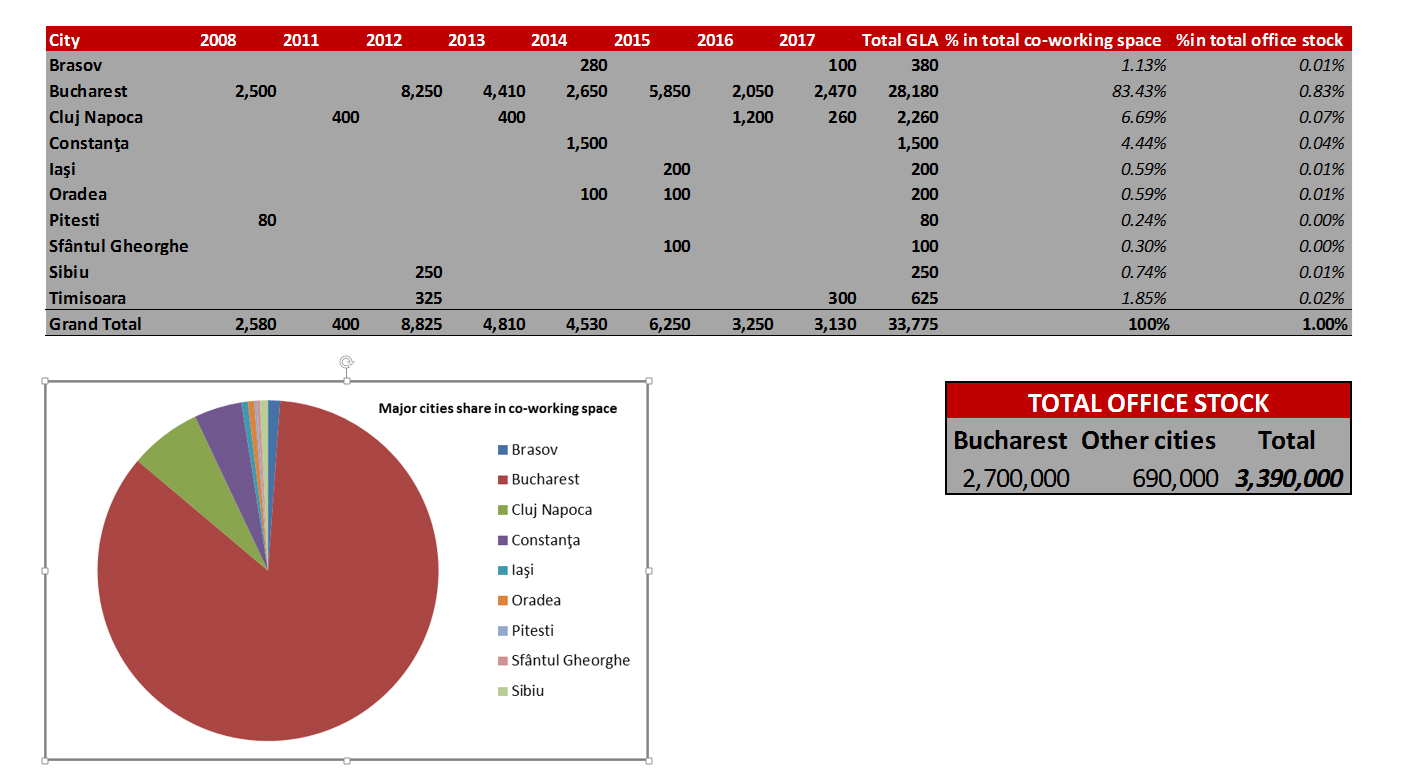
Source: Crosspoint Real Estate, October 2017
Coworking spaces are still a new, developing concept in the Romanian office market, with a little over 1% share in the total stock. Most of the spaces are available in Bucharest, amounting to 28,000 sqm GLA, almost 84% of the total available coworking spaces throughout the country. The largest amount of coworking space was delivered in 2012. So far, in 2017, 3,130 sqm of shared office space was delivered, out of which 2,500 sqm in Bucharest, 300 sqm in Timisoara, 260 sqm in Cluj-Napoca and around 100 sqm in Brasov.
The majority of the developers are local entrepreneurs, with a few big players like Regus and the newly entered Crossrider. The IT&C industry is mainly represented in this type of space, with startup businesses and freelancers occupying most of the available hubs, followed by freelance writers, bloggers and artists.
Given the growth of the IT sector’s contribution to the Romanian GDP and the increasing worldwide trend in encouraging small startup businesses and freelance activities, we expect that the stock for coworking spaces will gradually increase in the following years.
Google announced the opening of 6 regional hubs within universities in Bucharest, Cluj-Napoca, Iasi, Timisoara, Constanta and Brasov in order to connect the students with the local businesses. A group of digital consultants will offer free advisory services on online marketing and strategy to local SMEs. Also, the German retailer Kaufland is turning its stores’ roofs, parking lots, and plots of land located near schools into green spaces where people can grow their own crops. The urban gardens will also benefit from coworkingspaces with wi-fi, tea and other facilities.
Codrin Matei, Managing Partner, Head of Office Agency, Capital Markets and Business Development at Crosspoint declares: “Coworking spaces have become a trend globally and is picking up also in Romania, given the rising number of entrepreneurs and the characteristics of the Millennials generation, which value innovative ideas, freedom and socializing. Coworking spaces combine the independence of freelancing with the set-up and sense of community provided by the classic office environment. It is a beneficial alternative to traditional cubicles for employees, avoiding also the inherent isolation and proved to be advantageous for running a business.
The minimum lease for an office space starts from 3 years and for many start-ups this is prohibitive. Many developers abroad have noticed the contemporary trends and the market needs so they adapted quickly and created spaces that can be rented on daily rates or even month-long contracts, that come fitted with basic needs for running a small business, such as photocopier, printers, HVAC, reception, desks, roll-boxes and lockers, fully equipped kitchens, vending machines etc., being an affordable alternative for SMEs.”
The contacts one makes are key to the success of any business, regardless of size. The coworking environment brings together professionals with similar mindsets, goal-driven, who can for sure provide new perspectives and solutions when stuck with a persistent problem.
There is also a high sense of community in a shared working environment, counterbalancing the effects of working at home or in a public space. Working from home takes a certain amount of determination: getting out of bed, switch on the laptop, and accomplishing the tasks within deadlines, avoiding the distractions of home. This type of space is appealing for work-at-home professionals, frequent travelers, and individual contractors.
„Like never before, the attention of employees and employers target the working environment, being an important retention factor for talents, especially in the digital and IT field and we expect a growing number of projects to include flexible coworking solutions. The developers must understand the need of individuals for flexibility, for community or socialization and we recommend for them to include leisure areas and shared working places from the very early stages of the design, due to the rise in the Millennials workforce and the surge in new startups in Romania” said Codrin Matei.
